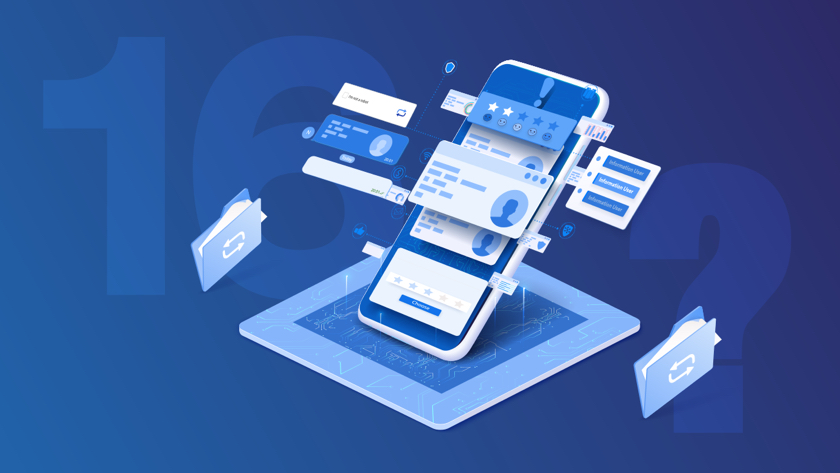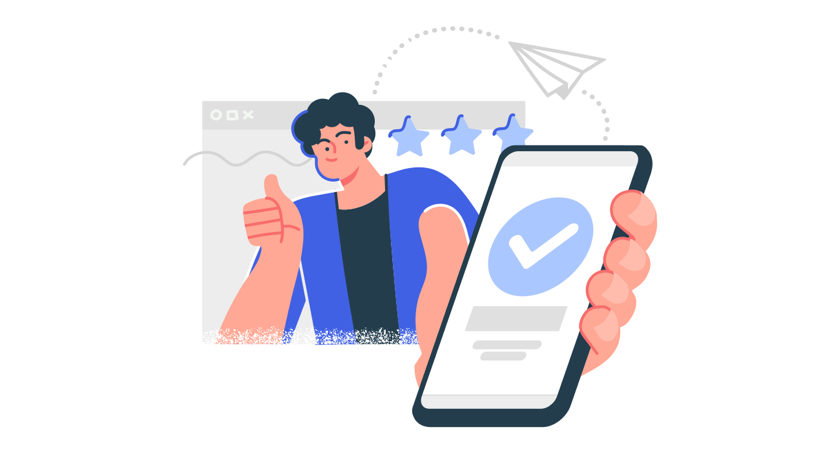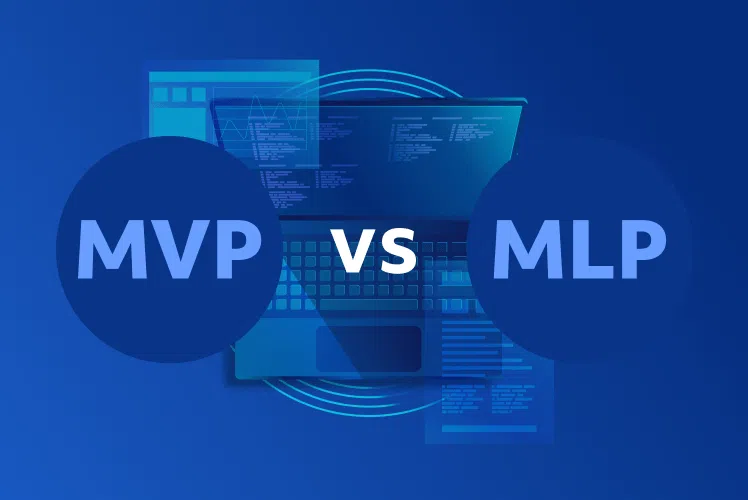Defining requirements for mobile app development can be a rather tedious process, but it’s an absolute must to make sure the team understands the client’s vision and knows exactly how the app should look and behave. Hence, to make sure that the delivered result 100% matches your expectations, it’s always a good idea to approach a software vendor with a set of prepared answers to the most common questions. This will significantly speed up the process of requirements elicitation and will help the software vendor understand what solution will be the best for your project.
SoftTeco has been designing native and cross-platform mobile applications since 2008, and throughout the years, we’ve come up with a set of questions that we typically ask our clients in order to learn what they expect and need. You can use them as a checklist to follow when thinking about your marketing strategy or you can use them to prepare a requirements specification for the first meeting with the software vendor.

Client’s requirements
For easier understanding, we broke all questions into three main categories and we will start with the first one, aka customer requirements. Your answers to these questions will specify how you see your mobile application and what its main features are.
What industry and domain is the mobile app designed for?
One of the first things that the software vendor wants to learn about the app is the industry and domain for which the mobile app will be designed. Note that the industry is a broad term (i.e. healthcare, fintech) while the domain is a more specific one and rather describes the type of the product (i.e. a CRM system or a banking application).
This question is important due to several reasons:
- The vendor may already have experience with similar apps for a specific industry and/or domain and thus can use this knowledge to deliver your product faster;
- The vendor should know in advance about any specific conditions that the industry/domain requires from software products (i.e. HIPAA compliance for any healthcare application);
- The vendor should understand what the industry standards are.
What value is the mobile app intended to bring to users?
This question specifies the main goal of the app and what its core functionality will be. For example, it can be convenient taxi services from any location (think of Uber) or easy messaging with multiple options, or a healthcare app for patients to facilitate the process of scheduling appointments. The intended value is supposed to resolve a certain issue that users are currently experiencing, offer them something that they need, and take a marketplace across competitors. As well, the answer to this question will help list down the app’s features and prioritize them.
How do you envision the product?
The client’s vision of the product (similar to the intended value) serves as a base for further requirements elicitation. The software vendor needs to know how the client plans to position the product among the competitors, what the intended scope is, what the basic functionality is, etc. All of this will help understand the size and complexity of the mobile app as well as outline specific areas to pay more attention to.
Who are the main competitors?
When planning mobile application development, one of the important things to consider is the existing competition. Even though some may think it’s more of a marketing and business strategy and doesn’t have to do a lot with the actual development, it’s not true. By knowing and understanding the competition, the software vendor can identify the core features that your app should have and help you come up with something that will make your product stand out.
What are the unique selling points of the app?

Unique selling points (or USP for short) imply those features that will make your product stand out from the competition. These features may not necessarily be an innovation, but they may be uncommon among the existing apps – or they may be something common but with a twist. Note that unique selling points should bring the most value to users, so don’t overcomplicate the app in an attempt to make it distinctive.
What are the main features of the app, or what will the app do?
When you approach a software vendor with a mobile app idea, the vendor usually expects you to have a rough list of the main app features. It does not have to be technical or very detailed – the main point here is for the software vendor to understand how the client sees the app functionality. This list of features will later be finalized by both the client and the business analyst and the features will also be prioritized (high, medium, and low priority) so the development team knows what to do in the first place and what can be added later. As well, this list will help the development team provide an approximate estimation of the project cost and how soon it can be delivered.
Who are the primary users of the mobile app?
It is important to know the primary users of the app because you will be building the user interface and functionality around them. Different users expect different things, so in order to make your application user-centric and engaging, you need to do a bit of preliminary research and learn what your target audience wants and needs.

What are the budget and expected timeframe for the market launch?
These questions are crucial as they will impact the development process in the following ways:
- The set budget will help prioritize the features and determine which ones will be delivered first and which ones may be added later (or dismissed).
- The timeframe for market launch will serve as a base for scheduling the development process and will impact the development speed.
- The budget will also impact the team composition in terms of the number of people, their roles, and responsibilities.
By knowing the expected budget and timeframe, the software vendor will be able to come up with the best solution without sacrificing product quality.
What platform do you want the app to run on?
The choice of the tech stack will primarily depend on the platform that you want your mobile app to run on. The main options are iOS, Android, or cross-platform and each option has its pros and cons. Hence, before approaching the software vendor, it’s always a good idea to do some research first and see what platform(s) you will really need. The choice of the platform depends on the target audience, budget, expected performance, app functionality, and other factors. Also, note that the development team will always be able to consult you on this question, so no worries if you can’t decide on your own.
What devices the app is supposed to run on?
This question is often overlooked, but it’s as important as the one above about the intended platforms of use. There are a bunch of devices that support mobile applications these days: smartphones, tablets, watches, TVs, and many more. So if you want your app to run on any of these, you need to inform the software vendor in advance as the selected devices will impact both the choice of technologies and UX/UI design.
Mobile app development
The next category of questions relates to the actual app development and is a bit more technical than the category above. We remind you once again that the software vendor does not expect you to have in-depth technical knowledge – just the main things regarding the app’s design, functionality, and management.
What is the suggested tech stack?
We have recently written an article on how to select a tech stack for your project where we give good advice on choosing technologies for your future application. Normally, the proposal of a tech stack is the responsibility of the development team as their experience allows them to understand what technologies suit the client’s requirements in the best manner. However, it may happen that a client comes to a software vendor with an idea of a tech stack in mind – if that’s the case, make sure you clearly understand how exactly these technologies will benefit the mobile app development process.
Do you have a design concept idea?
When discussing the application design, there are usually two options: the client fully delegates the design concept creation to the vendor or already has ideas about the design (or even has certain elements ready). Whatever the case is, keep in mind the following considerations:
- Even if you have a ready design concept in mind, it is recommended to discuss it with the UX/UI designer of the software company and see what can be improved. Since the designer normally has rich experience in creating the UX/UI parts of the app for different domains and different target audiences, he may advise you on something that you’ve missed.
- Always make sure the design is done for all platforms and devices that the app is supposed to run on. As well, test the design on all devices to ensure it looks equally well on each.

Will there be a Product Owner?
A product owner is responsible for communicating the vision of the product to the development team and making decisions about the product’s functioning. This person is considered a key stakeholder, and he usually has the final say on any decisions regarding the product.
Usually, the product owner comes from the client’s side – but this has to be clarified before starting the project so the software vendor understands how to set up communication processes.
Product release and launch
The last category of questions that a vendor normally asks relates to the product release and launch. Even though this is the last stage of the product development process, certain things have to be clarified in advance, so nothing is missed when the app is ready.
Are there any specifications to consider before the release?

When talking about specifications to consider, we usually mean local or industry-specific ones. For example, there may be certain legislations to follow, localization requirements, or industry-specific requirements to follow. Hence, all these requirements are to be discussed beforehand, so the software vendor develops the app with these specifications in mind and so the app can be released on the due date without any delays.
Who will prepare the marketing materials for the store?
While mobile app marketing is usually the responsibility of the client, the software vendor may offer his assistance in preparing the materials. This usually implies design services but upon request, the vendor may help with marketing research, copywriting, and other marketing-related tasks.
How will the support & maintenance project be structured?
What’s important to note here is that the S&M project has to be discussed before signing the contract. In this way, the vendor understands how the client expects the development team to react to any emergencies, what the time response will be, and approximately how many people are to be involved in the project maintenance.
Conclusion
Note that the list of questions that a software vendor may ask you is not limited by the ones above – but we’ve listed the main things to consider before entering the development stage. By thoroughly understanding and identifying project requirements and vision in advance, you will significantly facilitate and speed up the development process, not to mention transparent communication and elimination of possible misunderstandings with the team.


Comments